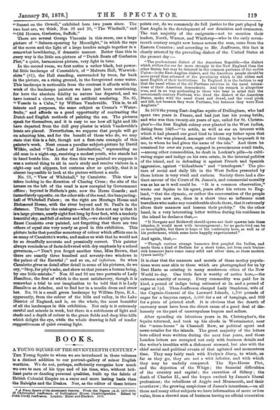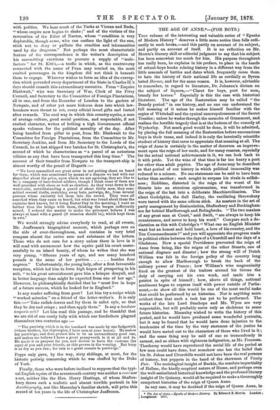BOOKS.
A YOUNG SQUIRE OF THE SEVENTEENTH CENTURY.* THE Young Squire to whom we are introduced in these volumes is a distinct addition to our portrait-gallery of minor English worthies. We do not, perhaps, sufficiently recognise how much we owe to men of his type and of his time, who, without bril- liant parts or dazzling personal qualities, built up the fabric of British Colonial Empire on a surer and more lasting basis than the Raleighs and the Drakes. Nor, as the editor of these letters * 4 Young Squire of the Seventeenth Ceeturp. From the Papers (A.D. 1877-1685) of Christopher Jeaffreeon, of Dullingham House, Cambridgeshire. Edited by J ohn Cordy Jeaftreson. London: Hunt and Blackett. 1878. points out, do we commonly do full justice to the part played by East Anglia in the development of our dominion and commerce. The vast majority of the emigrants—not to mention their leaders, North, Warner, and Winthrop—who in the early seven- teenth century sought new homes across the seas, came from the Eastern Counties ; and according to Mr. Jeaffreson, this fact is clearly attested by the prevailing dialect of the United States at the present day "The predominant dialect of the American Republic—the dialect -which strikes the ear far more strongly in the New England than the other States, but may be detected in the common parlance of the entire Union—is the East-Anglian dialect, and the American people should be more proud than ashamed of the peculiarity which is the oldest and most English of their institutions. In England it is the fashion to say that the nasal whine of the old Puritans survives in the nasal intona- tions of their American descendants. And the remark is altogether true, and in no way misleading to those who bear in mind that the seventeenth-century Puritans, who fixed the dialect of the American States, spoke with the nasal drant and drawl, and the vocal pitch and fall, not because they were Puritans, but because they were East Anglians."
In 1676 the young East-Anglian squire of Dullingham, who had spent two years in France, and had just lost his young bride, and who was then twenty-six years of age, sailed for St. Christo- pher's—the first English colony ever planted in the West Indies, dating from 16.23—" to settle, as well as see an interest with which it had pleased our good God to blesse my father upon that island, who was pleased, amongst other things, to bequeath it to
me, to whom he had given the name of the isle." And there he remained for over six years, engaged in promiscuous retail trade, —among other commodities, he dealt in Lockier's pills—in culti- vating sugar and indigo on his own estate, in the internal politics of the island, and in defending it against French and Spanish aggression, against " kidnabbers " and "interlopers." The pic- ture of social and daily life in the West Indies presented by these letters is very vivid and curious. Society there had a dis- tinct savour of the Court of St. James's, and commercial morality was as lax as it well could be. "It is a common observation," wrote our Squire to his agent, years after his return to Eng- land, "that the clymate, or rather the conversation of the people where you now are, does in a short time so influence most travellers who make any considerable abode there, that it extremely alters their manners and lessens their probity." On the other
band, in a very interesting letter written during his residence in the island he declares that,- ' If Newgate and Bridewell should spewe-out their spawns into these islandes, it would meet with incouragement ; for no gaole-bird can be so incorrigible, but there is hope of his conformity here, as well as of his preferment, which some have happily experimented."
And again, that,— " Though various strange humours first peopled the Indies, and made them a kind of Bedlam for a short tyme, yet from such braine- sick humours have come many solid and sober men, as these modern tymes testify."
It is clear that the manners and morals of these motley popula- tions were near akin to those which are photographed for us by Bret Harte as existing in many mushroom cities of the New World to-day. One little fact is worthy of notice here,—the extreme scarcity of money. Every commodity was paid for in
kind, a pound of indigo being estimated at 2s. and a pound of sugar at lid. Thus Jeaffreson charged Lady Stapleton, wife of the Captain-General of the Leeward Islands, 1,700 pounds of
sugar for a Smyrna carpet, 5,000 for a set of hangings, and 900 for a piece of printed stuff. It is obvious that the dearth of currency must have been the direct cause of a good deal of dis- honesty on the part of unscrupulous buyers and sellers.
After spending six laborious years in St. Christopher's, the
Squire returned, and took up his abode in Westminster, near the " mum-house " in Channell Row, as political agent and
news-retailer for the islands. The great majority of the letters here edited were written during the next four years, and these London letters are occupied not only with business details and the writer's troubles with a dishonest steward, but also with the chief social and political events of that agitated and momentous time. They may fairly rank with Evelyn's Diary, to which, so far as they go, they are not a whit inferior, and with which they may be usefully compared. The Rye-House Plot, and the dejection of the Whigs ; the financial difficulties of the country and capital ; the execution of Sidney ; the death of Charles II., and the hopes excited by James's liberal professions; the rebellions of Argyle and Monmouth, and their overthrow ; the growing suspicions of James's intentions,—on all these and many other subjects we have information of more or less value, from a shrewd man of business having no official connexion with politics. We hear much of the Turks at Vienna and Buda, "whose empire now begins to shake ;" and of the victims of the revocation of the Edict of Nantes, whose "condition is very deplorable, though some, who can outface the light of the sun, stick not to deny or palliate the cruelties and inhumanities used by the dragoons." But perhaps the most characteristic feature of the correspondence is the writer's description of his unremitting exertions to procure a supply of " male- factors " for St. Kitt's,—a traffic in which, as the controversy connected with the name of Penn may remind us, the most exalted personages in the kingdom did not think it beneath them to engage. Whoever wishes to form an idea of the corrup- tion which pervaded every department of the State in Charles H.'s days should consult this extraordinary narrative. From" Esquire Blathwait," who was Secretary of War, Clerk of the Privy Council, and Secretary to the Committee of Foreign Plantations, all in one, and from the Recorder of London to the gaolers of Newgate, and of other yet more hideous dens into which law- breakers were thrust to rot, every official loved gifts and lusted after rewards. The cool way in which this country squire, a man of average culture, good social position, and respectable, if not exalted character, writes of bribing a high Government official speaks volumes for the political morality of the day. After being bandied from pillar to post, from Mr. Blathwait to the Committee for Foreign Plantations, from the Committee to Mr. Secretary Jenkins, and from Mr. Secretary to the Lords of the Council, he at last shipped two batches for St. Christopher's, the second of which he characterises as "a parcel of as notorious villains as any that have been transported this long time." The account of their transfer from Newgate to the transport-ship is almost worthy of the pencil of Hogarth :—
"We have committed one great error in not putting shoes on board for them, which was occasioned by means of a dispute we had with our elopseller about the price, upon which we not agreeing, they are like to be a company of bare-footed soldiers, though I think some of them are well provided with shoes as well as cloathes. As they went down to the water-side, notwithstanding a guard of about thirty men, they com- mitted several thefts, snatching away bats, periwigs, &c., from several persons whose curiosity led them into the crowd. They were all searched when they camo on board, but what was found about them the captaine best knows, for it being Easter Day in the morning, I went no farther than the bridge with them, thinking the barges sufficiently armed. I ordered the master to mako the prisoners believe I was always at hand with a guard (if occasion should be), which kept them in awe."
We would strongly advise everybody to read, at all events, Mr. Jeaffreson's biographical memoir, which perhaps errs on the side of over-thoroughness, and contains in very brief compass almost the entire sum and substance of the letters.
Those who do not care for a story unless there is love in it will read with amusement how the squire paid his court unsuc- cessfully to an island beauty, of whom he writes that she was very young, " fifteene years of age, and soe many hundred pounds is the some of her portion besides four negroes." Unfortunately, the young lady, after a first favourable reception, which led him to form high hopes of prospering in his suit, "to his great astonishment gave him a brisque denyall, and in better language than might be expected from one of her age." However, he philosophically decided that he "must live in hope of a future success, which he looked for in England."
Is any reader suffering from gout? Let him try a recipe which "worked miracles" on a friend of the letter-writer's. It is only
this :—" Take radish-leaves and fry them in sallet oyle, so that they be dry and crispe ; and then apply them." Is any a laudator temporis acte? Let him read this passage, and be thankful that
we are rid of one costly folly with which our forefathers plagued themselves two centuries ago :—
" Tho perriwig which is in the tanckard was made by one Sedgewick (whose brother, the chyrurgion, I have seen at your house). He makes my perriwigs, and does protest this to be an extraordinary good one, and makes me believe I have a great pennyworth in it at £3 and 5s. He made it on purpose for you, and desires to have the custome (he says) of you and your friends, as this proves in the wearing. But keep it as dry as you can ; for rain is a great enemie to perriwigs."
Pepys only gave, by the way, sixty shillings, at most, for the historic periwig concerning which he was chaffed by the Duke of York.
Finally, those who were before inclined to suppose that the typi- cal English squire of the seventeenth century was neither a roué nor a sot, neither like the Hon. Henry Hastings, of whom Shaftes- bury draws such a realistic and almost terrible portrait in his Autobiography, nor like Macaulay's familiar sketch, will prize this record of ten years in the life of Christopher Jeaffreson.



































 Previous page
Previous page